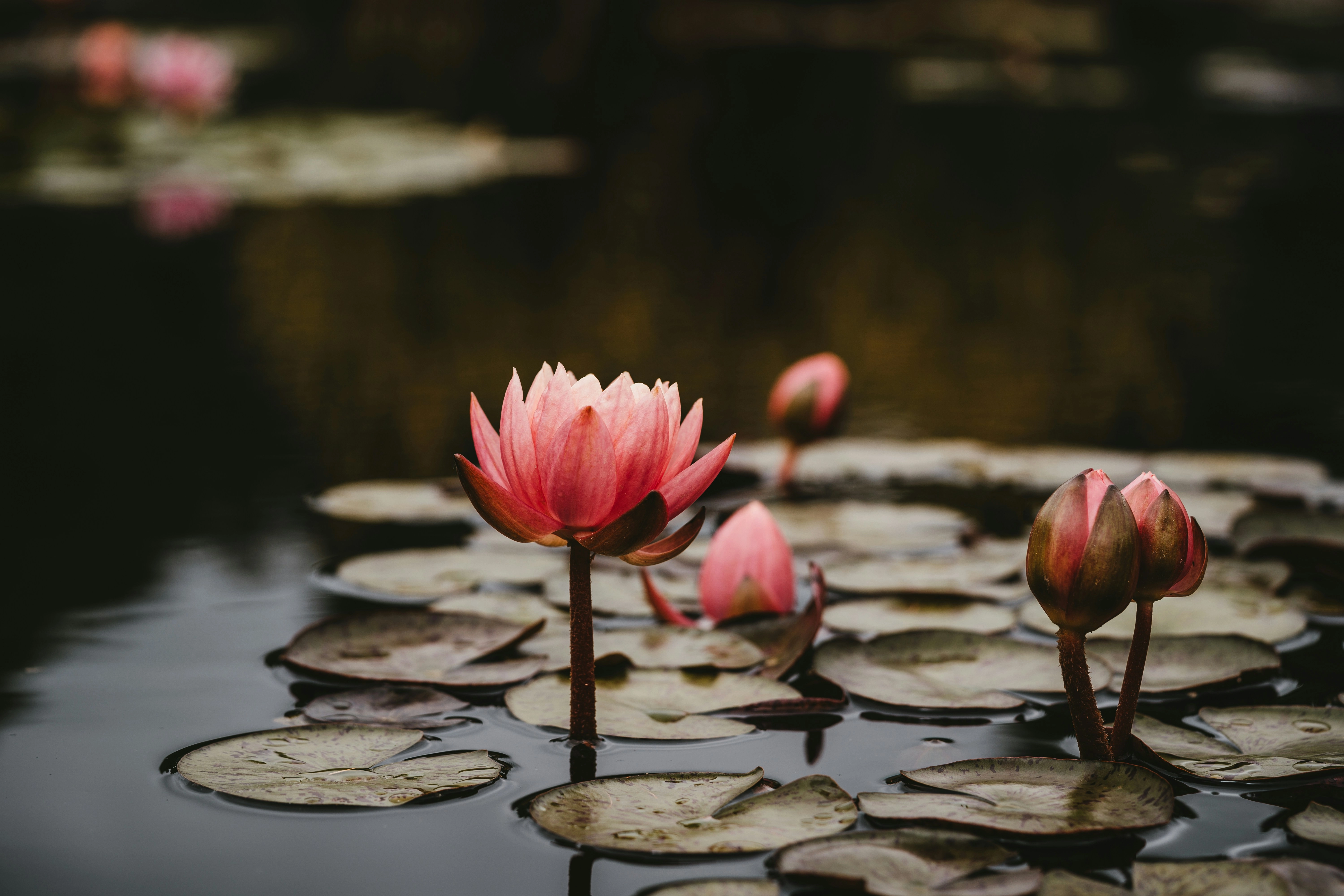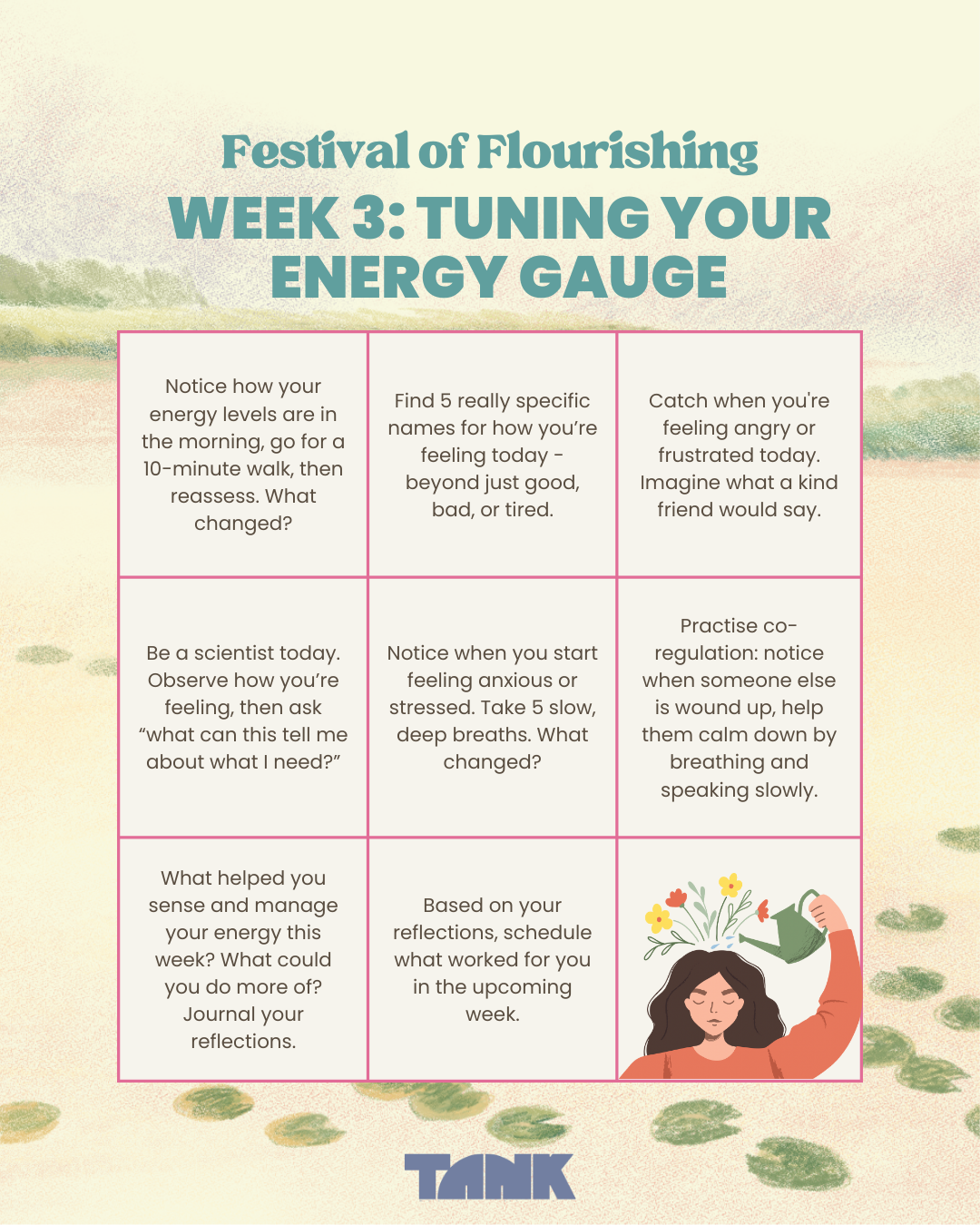Festival of Flourishing week 3: tuning your energy gauge

October is Mental Health Month, and we'd like to keep the focus squarely on the "health" part of "mental health."
From Monday 30 September through to Friday 1 November, we're offering fun, practical daily experiments in flourishing. They'll help you bring down stress, improve recovery, tune in to what your nervous system is telling you, and put the pieces of the puzzle together in a way that works for you.
~~~~~~~~~~~~~~~~~~~~~~~~~~~~~~
Welcome to week 3! Over the past two weeks, we’ve been experimenting with reducing stress and amplifying recovery.
There’s no “right” level for stress or recovery. What’s important is the balance between them.
Balance, demystified
Q: How do you know when you’ve got the balance between stress and recovery right?
A: You’ll feel energised and ready to go 🚀
Tuning in to what your body can tell you about your stress-recovery balance probably isn't something you've been taught to do. In fact, it's more likely you've absorbed messages like “no pain, no gain”, "go hard or go home", “push through.”
Ignoring signals that your balance is off makes it very hard to flourish. Over time, there's a good chance it will also stop you from performing well on what matters to you, and raise your risk of burnout.
That’s why this week's experiments are all about tuning in, and making good use of the information on offer when you do.

Experiment 1: noticing change
Start by paying attention to your energy level as you begin the day. Are you feeling a bit flat, full of beans, or somewhere in between?
Now try a short walk outside, hopefully with some bright sunlight and fresh air. Try to keep your focus on the sensations of walking - the feeling of your feet against the ground, the breeze on your face, any smells or sounds that stand out for you.
When you're done, jot down how you're feeling. What difference did the walk make? Are you more alert, or less? Feeling more ready for the day, or less? In a better mood, or worse?
Try to notice without judging: the idea here is just to tune in.
Evolution has equipped us with a range of internal sensors that help us get our needs met. We're all familiar with signals like feeling hungry, thirsty, hot or cold. More subtle signals, like feeling a bit tired or irritable, are much easier to tune out. Just as it's best not to wait until you're hypothermic to put on another layer of clothing, sensing low energy lets us top back up before it becomes a problem.
Experiment 2: naming
When someone asks you how you are today, take the challenge: how are you really feeling?
The more specific you can be about how you're feeling, the better you can make use of the information your body's providing. Uncertainty is expensive - when your brain's not sure what it needs to do, it burns energy keeping its options open. Naming narrows the options, and increases the chances that you'll be able to respond intentionally rather than through habit.
Also, it's fun: short of a word that precisely captures how you're feeling? Feel free to make one up. We'd LOVE to know what you come up with.
Experiment 3: creating distance
Try to catch when you're starting to feel angry, irritable, or frustrated today. Take a breath and imagine what a kind friend would say.
A little like the reframing experiment from week 1, this one is about getting some distance, this time by taking a different perspective.
You may well still feel angry, irritable or frustrated, but a second perspective will almost always give you better, more intentional options for how you respond.
Experiment 4: be a scientist
Feelings are just your body's way of flagging what it needs. During the day today, take a minute to check in with how you're feeling and jot down what that can tell you about what you need.
If you notice you're feeling jittery about a big event, what's missing? Perhaps another practice run, or some more feedback? If you're feeling low on motivation for a task that just needs to get done, what might help? Maybe reconnecting the task with a bigger goal?
How you're feeling needn't be your only source of truth, but it's often useful information that we just as often ignore.
Experiment 5: take it down a notch
Actively regulating your nervous system is a great skill to build once you're tuned into what state it's in to begin with. Hyper-stimulating environments constantly nudge you towards high-activation states that can feel just like anxiety, so being able to calm your body down is a very useful tool in the balance toolkit.
Today, when you notice you're starting to get amped - maybe your breath gets a little shallow, or your shoulders are up near your ears, or your heart rate is a little high - pause and take five slow, deep breaths. Notice what changed.
It's worth trying this a couple of times during the day. You may notice that the effect is faster with practice.
Experiment 6: co-regulate
Experiment 5 was about self-regulation. This one's about co-regulation. If you notice that someone you're talking to today is getting wound up, you may also notice that you start to get wound up too. That's called co-regulation. We're social animals, and what others around us feel, we begin to feel too.
If you can, make a conscious effort to keep your own level of activation down, maybe by using the breathing exercise from experiment 5. That will make it easier to help the other person you're with calm down, too - simply by breathing and speaking slowly and calmly.
Experiment 7: reflect
Yes, again! As for the past couple of weeks, we're recommending reflection as an experiment. If journaling or retelling your favourite experiments aren't your thing, you could try something a little more creative. Try sketching, painting or cartooning instead. Write a limerick. Maybe if you're feeling very retro, sculpt an experiment in mashed potato (and definitely share a photo with us if you do, please!)
Have fun, share your stories, and we'll see you next week!
